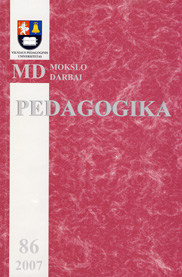Moksleivių socialinės kompetencijos ugdymo galimybės
Possibilities of Social Competence Training in School Children
Author(s): Jorūnė Vyšniauskytė-RimkienėSubject(s): Education
Published by: Vytauto Didžiojo Universitetas
Keywords: social skills; social competence; social skills' group. Though the results of the research show significant training; changes of adolescents' self-esteem
Summary/Abstract: The purpose of the present study is to evaluate the possibilities of social skills' training on social competence in school children. The studied consisted of 50 pupils of the seventh grade (13,0 ± 0,03) - 25 adolescents in each - experimental and control groups. Procedure of sociometric measurement [3]; social skills questionnaire, the questionnaire of Revised Class Play (RCP, 1985) and M. Rosenberg's (1965) scale of self-esteem were applied during the study to measure social competence in experimental and control groups. The experimental group participated in social skills training program that included eight 45 minutes long, structural classes [7 et al.]. Educational influence on control group was not applied. The results of those who participated in the training program (experimental group) and those who did not (control group) were compared. The comparison show The hypothesis that pedagogical influence in the form that adolescents, who belong to the experimental group of social skills training can provide opportunities to experienced change tendencies in assessing their social increase social competence among adolescents was skills. For example, adolescents from experimental group proven. In the discussion some conclusions why there were able to better understand their emotions, to listen were small effects on social competence of adolescents to others, and to solve problems. After the end of the are drawn and recommendations what can be effective educational experiment significant changes (p < 0,01) in the social competence training are provided. An of evaluating the pupils' social skill to listen to others in important notion is that the number of the participants the experimental group were estimated. There were no is small and this complicates providing statistically significant sociometric status's and peer reputation significant results. differences between the trained and the non-trained.
Journal: Pedagogika
- Issue Year: 2007
- Issue No: 86
- Page Range: 99-104
- Page Count: 6
- Language: Lithuanian

